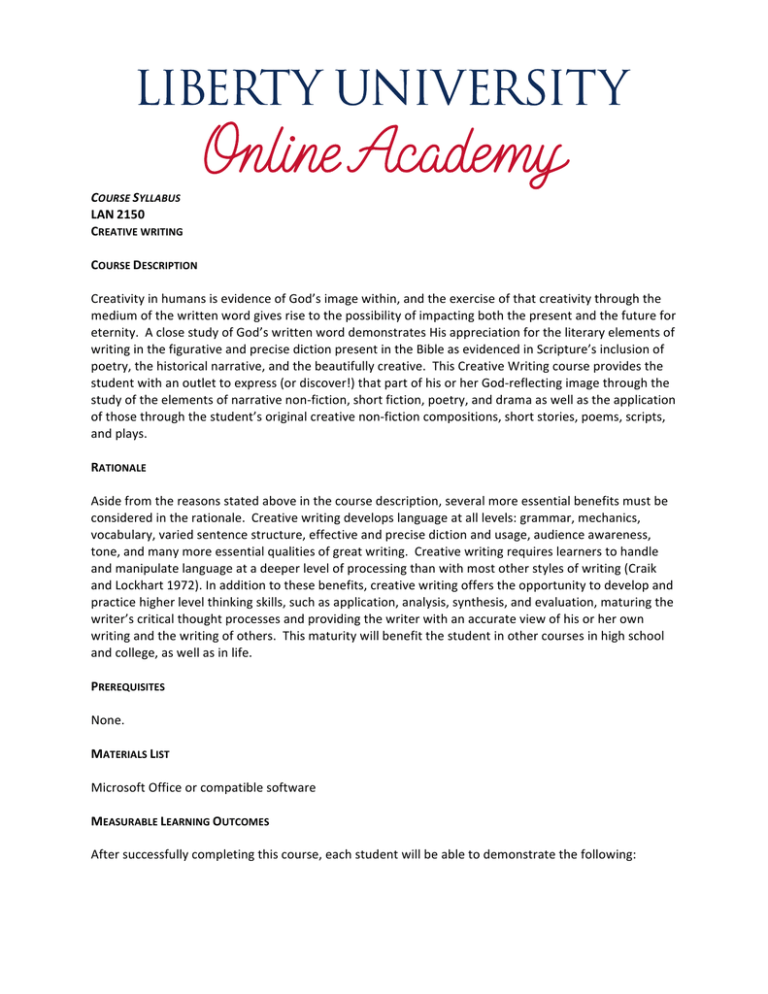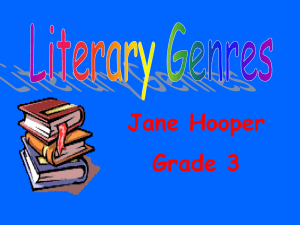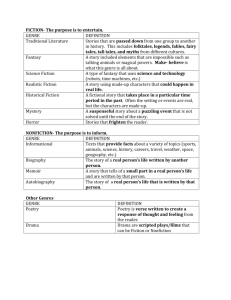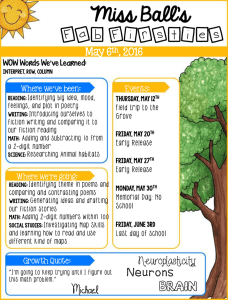Document 14663891
advertisement

COURSE SYLLABUS LAN 2150 CREATIVE WRITING COURSE DESCRIPTION Creativity in humans is evidence of God’s image within, and the exercise of that creativity through the medium of the written word gives rise to the possibility of impacting both the present and the future for eternity. A close study of God’s written word demonstrates His appreciation for the literary elements of writing in the figurative and precise diction present in the Bible as evidenced in Scripture’s inclusion of poetry, the historical narrative, and the beautifully creative. This Creative Writing course provides the student with an outlet to express (or discover!) that part of his or her God-­‐reflecting image through the study of the elements of narrative non-­‐fiction, short fiction, poetry, and drama as well as the application of those through the student’s original creative non-­‐fiction compositions, short stories, poems, scripts, and plays. RATIONALE Aside from the reasons stated above in the course description, several more essential benefits must be considered in the rationale. Creative writing develops language at all levels: grammar, mechanics, vocabulary, varied sentence structure, effective and precise diction and usage, audience awareness, tone, and many more essential qualities of great writing. Creative writing requires learners to handle and manipulate language at a deeper level of processing than with most other styles of writing (Craik and Lockhart 1972). In addition to these benefits, creative writing offers the opportunity to develop and practice higher level thinking skills, such as application, analysis, synthesis, and evaluation, maturing the writer’s critical thought processes and providing the writer with an accurate view of his or her own writing and the writing of others. This maturity will benefit the student in other courses in high school and college, as well as in life. PREREQUISITES None. MATERIALS LIST Microsoft Office or compatible software MEASURABLE LEARNING OUTCOMES After successfully completing this course, each student will be able to demonstrate the following: 1. Demonstrate an understanding of various literary elements, forms, and structures through the application of these elements in the student’s original narrative essays, short stories, poems, and dramatic works. 2. Experiment and demonstrate familiarity with a variety of forms and styles of creative writing in order to develop each student’s individual style and voice. 3. Demonstrate self-­‐analysis and critique through the process of employing editing and revision strategies in drafts of creative projects. 4. Produce a sustained creative writing portfolio, including prewriting, journal entries, activities, and early drafts, for later analysis, revision, or inspiration. 5. Create works of narrative non-­‐fiction, short fiction, poetry, and drama incorporating advanced literary qualities. 6. Evaluate the effectiveness of well-­‐written essays, short stories, poems, and plays. 7. The student will read and analyze essays, fiction, poetry, and scripts from published sources. 8. Students will develop fluency, logic, clarity, and creativity. 9. Students will apply knowledge of language structure, parts of speech, language conventions, media techniques, figurative language, and genre to create. 10. Students will adjust their use of spoken, written, and visual language to communicate effectively with a variety of audiences and for different purposes. 11. Students will be able to recognize, define, and avoid plagiarism. 12. Students will use listening and oral skills to communicate effectively and share compositions/creations with an audience. 13. Students will understand the connection of culture and diversity in Creative Writing and understand how they can share the Gospel with diverse cultures through the use of their creative writing skills. COURSE REQUIREMENTS AND ASSIGNMENTS 1. Varied writing assignments for each lesson 2. Regular quizzes on material taught (weekly or bi-­‐weekly) 3. Original, creative compositions for each lesson 4. Several major compositions per genre—non-­‐fiction, fiction, poetry, drama 5. Five Module tests (by genre) 6. Portfolio Project of student’s creative compositions 7. One Semester Exam (cumulative) COURSE GRADING AND POLICIES Grading Weights Lesson Assignments 25% Quizzes and Written Assignments 35% Tests 40% Scale A 93 – 100 B 85 – 92 C 77 – 84 D 70 – 76 F Below 70 Other Policies Academic Misconduct See pages 32-­‐35 of your Student Handbook Repeating Assignments Students may repeat lesson assessments until they reach a 90% mastery threshold. Quizzes and tests cannot be repeated to gain a higher grade. Quizzes and tests may be reset for technical issues, but a new set of questions will be generated.





